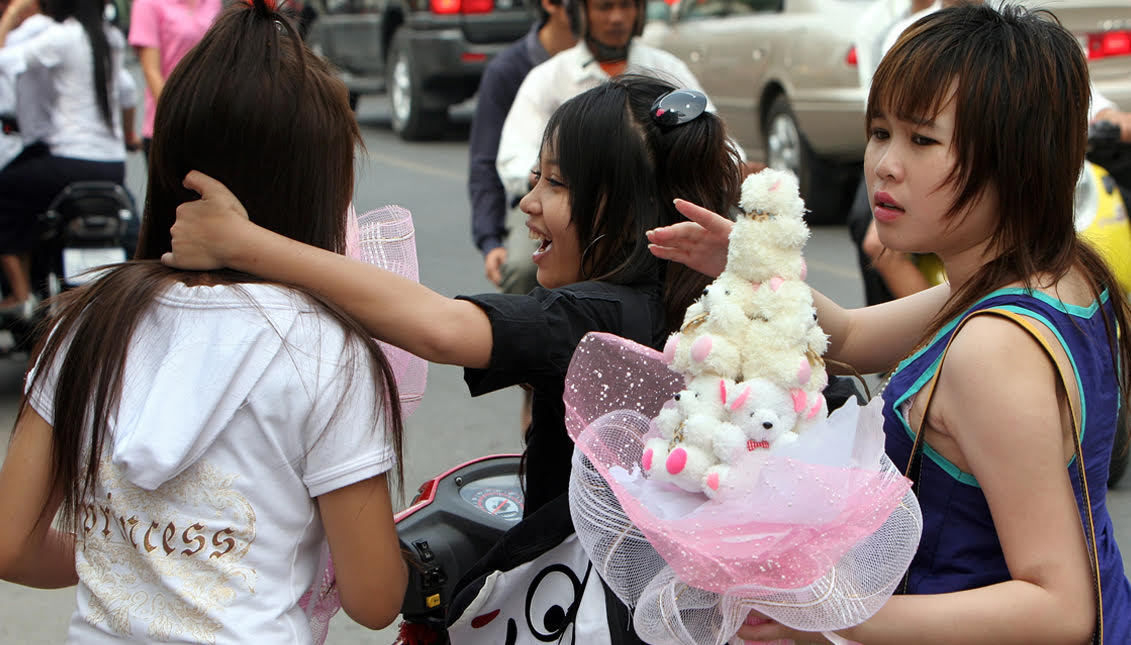
Cambodian women fight back against law that would regulate their clothing
The hashtag #mybodymychoice in Khmer has trended on social media across the country.
Women in Cambodia have taken to social media to protest a proposed law that would police their clothing in the name of keeping “public order.”
According to the Thomson Reuters Foundation, the draft legislation, known as the “Law on Public Order,” would regulate men’s and women’s clothing, banning women from wearing outfits perceived as “too short” or “too see-through.” If Cambodia’s legislature approves the law, it will take effect next year.
The proposed law would also ban men from being shirtless in public and regulate how much noise people can make.
“It’s not entirely a matter of public order, it’s a matter of tradition and custom,” explained Ouk Kimlek, Cambodian interior ministry secretary.
Kimlek and other supporters of the bill maintain that these measures are required to maintain social order and “preserve national dignity.”
But the conservative legislation hasn’t been received well by many women, who have started posting photos of themselves wearing clothes that would be deemed inappropriate under the new law, using the hashtag #mybodymychoice in the Khmer language.
According to Reuters, some women have also posted photos of themselves in bathing suits.
Tan Molika, a recent high school graduate, launched an online petition calling for the draft legislation to be withdrawn, and it has already reached over 18,000 signatures.
Molika told VICE News that her original intent with the petition was to raise awareness. Still, as it grew in numbers and popularity, she has received several requests to submit it to the Cambodian government.
“With the traditional Cambodian society being so close-minded and conservation, seeing everyone stand up now for what they believe in makes me so happy,” Malika said.
Painters, filmmakers, writers, and musicians have also been denouncing the law, many of them questioning the role of the ministry for women’s affairs as the restrictions increase.
“Congrats, we’re going back to the 1960s,” artist Lisa Mam posted on Facebook.
In recent years, actresses and singers have also been targeted by the government over their attire, with some facing performance bans.
In April, a Cambodian woman named Ven Rachna spent six months in prison on pornography charges for wearing “inappropriate” clothing during Facebook live streams, causing a public outcry.
Before Rachna’s arrest, Prime Minister Hun Sen told authorities to track down women online selling items that were dressed too “sexy.”
RELATED CONTENT
Many Cambodians still expect women to be docile, submissive, and quiet, according to a centuries-old code of conduct known as Chbap Srey.
The code of conduct encourages very old-school ideas of women’s roles in society, and the United Nations said last year that it should be abolished entirely from schools.
“Your skirt must not rustle while you walk.
You must be patient and eat only after the men in your family have finished.
You must serve and respect your husband at all times and above all else.
School is more useful for boys than girls,” it reads.
Chak Sopheap, executive director of the Cambodian Center for Human Rights, told Reuters last week that the proposed law is yet another attempt to stifle women’s freedoms.
“In recent months, we’ve seen the policing of women’s bodies and clothing from the highest level of government, belittling women’s rights to bodily autonomy and self-expression, and placing blame on women for violence committed against them,” Sopheap said.
Many women’s rights groups worry that this new law would put women further at risk of sexual harassment and violence by fostering a culture of victim-blaming. But there is hope.
Deputy director of Amnesty International in the Asia-Pacific region, Ming Yu Hah, is pleased to see how many people are talking about the issue.
“It is rare for a draft law to be shared like this, giving us the chance to discuss it as a society,” she said. “The reaction on social media is very positive: people from all parts of society are talking about gender equality.”











LEAVE A COMMENT:
Join the discussion! Leave a comment.